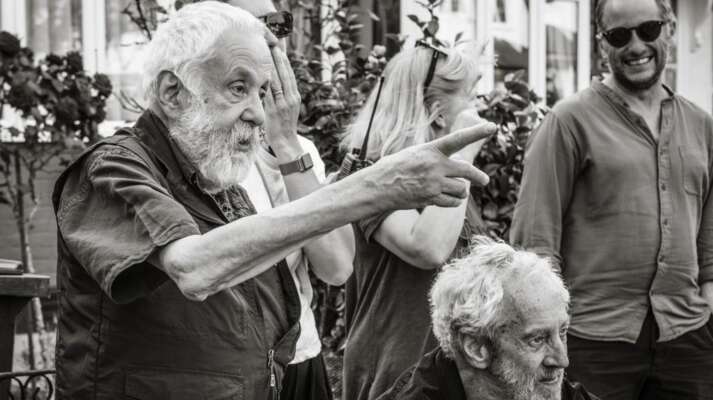A Colette Timeline
A history of Colette and the world she changed
A Colette Timeline
Written by Peter Bowen
"Here was a woman well ahead of her time," exclaims director Wash Westmoreland about the subject of his film Colette. Chronicling the early years of Colette's life-her marriage to Willy (Dominic West), the creation and immense success of the Claudine novels, and her ongoing romance with Missy (Denise Gough)-the film both captures a moment in history and a woman whose refusal to be constrained by social convention helped change it. As one of France's great modern artists, Colette's life and work redefined the way we think about love, sex, and gender. As a renown cultural figure, Colette not only lived through the pageant of 20 th century history, but she was intimately connected with the writers, philosophers, and artists who shaped our modern world.
To give a sense of the grand scope of her life and times, we've put together a timeline that chronicles Colette's important dates and achievements as well as the artists and writers who were part of her fascinating world.
1873 Colette is born in Saint-Sauveur-en-Puisaye, France, as Sidonie-Gabrielle Colette. She is the daughter Captain Jules Colette, an injured war hero who now works as a tax collector, and Sido, whose previous husband had died.
1893 Colette marries Henry Gauthier-Villars (aka Willy), a leading Parisian man of letters who is fourteen years her senior. They settle in Paris.

1900 Colette writes Claudine at School. The novel proves a runaway best seller. Colette writes three more-Claudine in Paris (1901), Claudine Married (1902) and Claudine and Annie (1903).
1902 Cinema pioneer Georges Méliès' silent movie A Trip to The Moon opens in Paris. Within a decade, Colette would become fascinated by film, penning scenarios for early films as well as reviews for the French journal Film. In 1917, the Claudine novels are adapted into films.
1906 Colette separates from Willy and begins a long romance with Missy (Mathilde de Morny).
1910 Colette publishes The Vagabond, her first major work after the Claudine books. That same year, she finalizes her divorce from Willy.
1912 Colette marries Henry de Jouvenel, the editor of Le Matin newspaper. The next year she gives birth to her daughter, Colette de Jouvenel (who would take the nickname Bel-Gazou).

1913 Marcel Proust publishes Swann's Way, the first novel of his masterwork Remembrance of Things Past. Many of the characters in his epic piece are drawn from people Colette befriended in Paris' literary salons.
1914 World War I begins. As a reporter for Le Matin, Colette becomes one of the first women to report from the front lines. Her war reporting is later published as a book Les Heures longues ( The Long Hours).
1918 World War I ends when an armistice is signed between France and Germany.
1920 Colette publishes Chéri. Later adapted to stage and film, the novel was a huge success, generating a sequel, The Last of Chéri, six years later. Colette was promoted to membership in France's Légion d'honneur that same year.

1926 Maurice Ravel stages his opera The Child and the Spells with a libretto by Colette. Two years later, Ravel's orchestral piece Bolero becomes a musical sensation.
1928 Gabrielle "Coco" Chanel's women's tweed suits revolutionize fashion. Three years later, Chanel purchases the country cottage La Gerbière that Colette shared with her soon-to-be-third husband Maurice Goudeket.
1934 Colette divorced her second husband, Henry de Jouvenel.
1935 Colette marries her third husband Maurice Goudeket.
1940 The French and British are defeated by German forces. Northern France becomes an occupied territory and the south is run by the collaborationist Vichy government.
1941 Maurice Goudeket, who is Jewish, is arrested by the police, but later released.
1944 France is liberated from the Germans. Colette is chosen to sit on the prestigious Académie Goncourt.
1945 Colette publishes her novella Gigi. Jean-Paul Sartre tells her how much he loves and admires her writing. The previous year, Sartre's play No Exit makes a literary splash leading to him receiving the Nobel Prize in Literature in 1964.

1946 Jean Cocteau releases his film Beauty and the Beast. Living as neighbors in the Palais-Royal during the Occupation, Colette and Cocteau developed a special relationship. "You are my young brother, who is in everything, magically, my elder," Colette told the famous poet and filmmaker.
1947 Andre Gide receives the Nobel Prize for Literature. In 1920, Gide wrote Colette a fan letter: "I am myself completely astonished to be writing to you, completely astonished by the great pleasure I've had in reading you. I devoured Chéri in a single breath."
1949 Simone de Beauvoir publishes the landmark feminist work The Second Sex. The year before she wrote about meeting Colette: "She is the only really great woman writer in France, a really great writer… I was in love with her, through her books, when I was a girl, so it meant something to me to see her."
1951 Gigi is adapted into Broadway play with Audrey Hepburn in the title role. Colette herself picked Hepburn after spotting her in Monte Carlo earlier that year.
1954 On August 3, Colette dies at her Palais-Royal apartment in Paris with her husband Maurice by her side. On August 7, she is given an official state funeral, the first ever given to a woman in France. More than six thousand people show up to pay their respects.

1958 Vincente Minnelli's releases his film musical Gigi starring Leslie Caron and Maurice Chevalier with lyrics and music by Alan Jay Lerner and Frederick Loewe.
1959 Gigi wins nine Academy Awards, including Best Picture.


